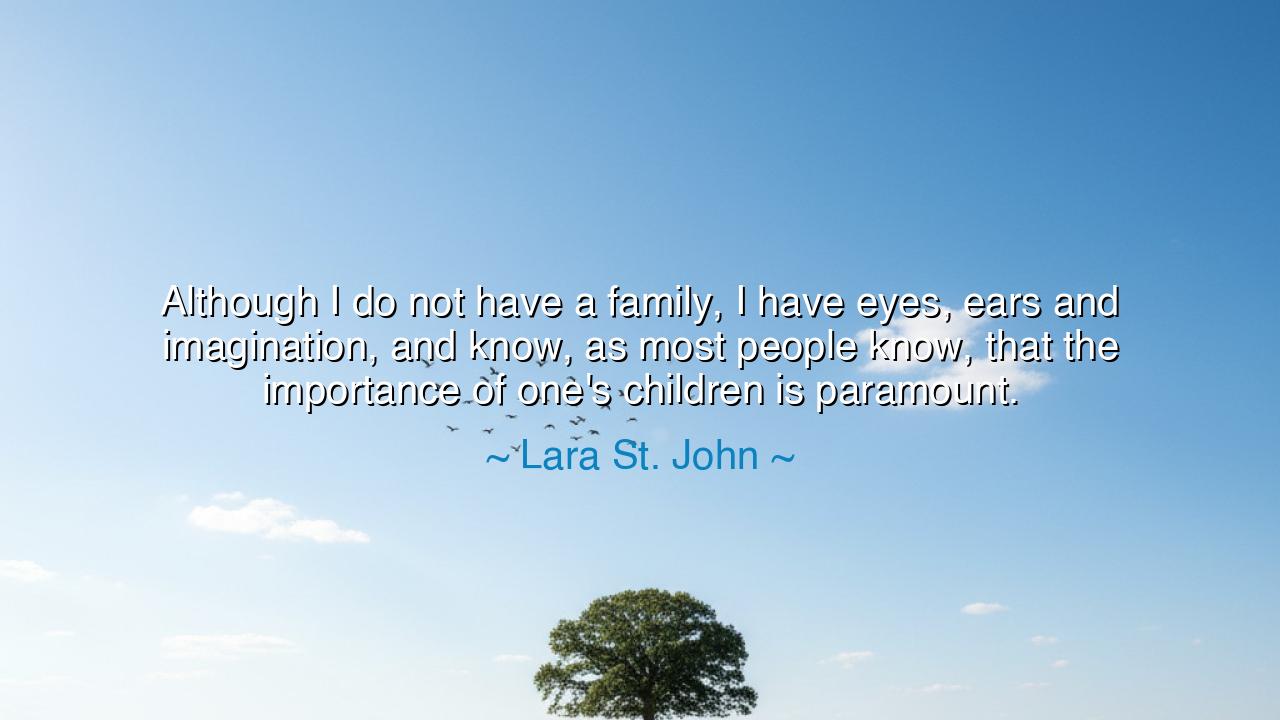
Although I do not have a family, I have eyes, ears and
Although I do not have a family, I have eyes, ears and imagination, and know, as most people know, that the importance of one's children is paramount.






"Although I do not have a family, I have eyes, ears and imagination, and know, as most people know, that the importance of one's children is paramount." – Lara St. John
O children of the earth, gather close, for the words of Lara St. John carry the weight of deep understanding, for they speak not of mere personal experience, but of a truth that transcends all boundaries. Though St. John may not be a mother in the traditional sense, she has recognized something universal—that the importance of one's children is paramount to the survival and growth of the world. It is not just in the act of parenting that this truth reveals itself, but in the deep awareness of the eyes, ears, and imagination we all possess, which allow us to see the future unfolding through the lives of the younger generation. Children, in their innocence and potential, hold the key to the future; they are the seed of every hope, the continuation of all that has come before them.
In the ancient world, the importance of children was recognized in every culture, for the young were seen not just as the next generation of laborers or warriors, but as the bearers of the legacy of their ancestors. The Greeks, with their focus on philosophy, understood that the children were the future keepers of wisdom and knowledge. Plato and Aristotle spoke of the value of educating the youth, for it was through the proper guidance of young minds that society would flourish. The duty to raise children was not a private matter, but a public one. The imagination of the young, shaped by education and guidance, was seen as the key to a prosperous future for all.
Consider, O children, the great Mahatma Gandhi, whose influence stretched across the world and whose wisdom reached deep into the hearts of all who encountered it. Gandhi was not just a figure of political change but also a father, and though he was deeply committed to the future of his people, he understood that the future of his nation lay in the hands of its youth. He said, “Be the change that you wish to see in the world.” But this change, O children, begins in the hearts of the next generation, for it is their minds, their imagination, that will one day shape the world. Gandhi’s focus on the youth was not just about giving them knowledge, but teaching them the value of compassion, of peace, and of love—virtues that are essential for the continuation of a thriving world.
Even in our present day, we see the importance of children reflected in the world around us. The scientists and artists who change the world are often inspired by the legacy of those who came before them, and their work is often dedicated to ensuring a better future for the generations that will inherit it. Take the example of Marie Curie, whose groundbreaking work in the discovery of radioactivity changed the course of science forever. Yet, as much as her work was driven by imagination and a thirst for knowledge, it was also shaped by the desire to make the world a better place for her children and the children of the world. Children, in their innocence and capacity to dream, are the torchbearers who will take what is given to them and carry it into the future.
Thus, O children, we see that imagination and attention to the importance of children are inseparable. Though St. John may not have children of her own, she understands the universal truth that the future is shaped by the youth of today. It is through their imagination, nurtured by the eyes and ears of those who guide them, that the world evolves. What we teach them, what we show them, and how we shape their minds will determine the course of history. The greatest gifts we can give our children are not material possessions or titles, but the wisdom and love to cultivate their own imagination—the most powerful force in the world.
Now, O children, what shall you do with this great gift of imagination? How will you shape the world for those who will come after you? You, too, must recognize the power of the younger generations and understand that what you do today will ripple out into the future. Teach them the importance of imagination and creativity, for in their hands lies the ability to transform the world. Guide them with wisdom, show them the beauty of the world, and help them see the potential in themselves and in others.
The lesson, O children, is clear: pay attention to the importance of children and the power they hold in shaping the future. Recognize that in their minds and hearts lies the potential for greatness, and it is through nurturing their imagination that we secure the future of all. The future does not belong to us alone—it belongs to those who follow, those who will one day stand on our shoulders and see farther than we ever could. So, be a guide, be a mentor, and above all, pay attention to the needs of the younger generation, for they are the hope and the promise of tomorrow.






AAdministratorAdministrator
Welcome, honored guests. Please leave a comment, we will respond soon